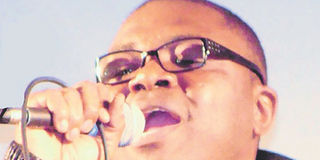Congolese gospel singers take over rumba baton

Congolese gospel musician J.B. Buse, a former Zaiko Langa Langa singer. Buse is now based in Canada. Photo/COURTESY
The Democratic Republic of Congo, the country often referred to as the mecca of African music, is reverberating with a new kind of sound.
It is the recent rise and rise of what is generally referred to as gospel rumba. Its beat is familiar, yet its message is radically different.
Some of the leading exponents of the new gospel rumba include top musicians who enjoyed great success and fame throughout the region in the 1980s.
These second generation of Congolese musicians who dominated the music scene in Congo Kinshasa and Congo Brazzaville from the 1970s to the 1990s belonged to top bands including Zaiko Langa Langa, Choc Stars and Anti-Choc.
Those who have crossed over into gospel music include Carlito Lassa, best known for his lead vocals on the Maya song composed by veteran Lutumba Simaro.
He was also once a great vocalist with Choc Stars, whose compositions, La Reconnaissance, are some of the gems of Congolese music.
Others are his former colleague in the band, Debaba El-Shabab and Bimi Ombale. Ombale, who had great success with Zaiko, and his fellow singer, J.B. Buse, toured Kenya in 1987 for a fund-raising concert for the All Africa Games in Nairobi.
Buse now lives in Toronto, Canada. He visited Kenya in 1990 with Zaiko Langa Langa Langa Familia Dei in a tour arranged by Congolese promoter, Tamukati Ndongala.
The talented musicians surprised everybody by turning their backs on their successful secular careers to go into gospel music.
Carlito has, since the dizzying heights of success and fame, been leading a small gospel group that performs during Christian crusades in Kinshasa.
But there are other Congolese gospel music mega stars riding high on the crest of their Christian ministries. One of the most notable is L’or Mbongo, known for her songs like Nkosi na Yuda, Loboko and Nakotia Motema.
She is a huge star, who draws big crowds to her crusades and live music concerts. Other leading Congolese gospel rumba musicians include Patrice Ngoy Musoko “Jesus La Solution”, Jose Nzita, Alain Moloto, Sandra Mbuyi, Marie Misamu, and Pastor Lifoko Duciel (“Dans Cinente Nous”).
Also on the list are Matou Samuel, known for songs like Mboka Mopaya and Tambwisa Ngai, and former TP OK Jazz singer Jolie Detta.
In Kenya, among the leading proponents of gospel rumba include Gerry Mbuy, who recently released Uwepo, and Pammy Muleka. Mbuy says: “Congolese gospel is now dynamic with all kinds of styles being incorporated.”
Also enjoying great success in gospel music is the Netherlands-based Congolese band, Makoma, and US based Suza Bamona and Deyesse Mukangi. Deyesse had stints with her mentor Bozi Boziana and later Koffi Olomide.
Perhaps the more exciting are two young women who switched from gospel to secular music and have become much greater stars.
Cindy Le Couer, now a core member of veteran crooner Koffi Olomide’s Quartier Latin band, started out under the wings of gospel musician Carlito Lassa.
Her defection to secular music was so sensational that it drew condemnation from Christian groups. She was told to her face that she had abandoned God to cavort with the devil, a thinly veiled criticism of Koffi’s explicit lifestyle.
But Cindy has stayed her course, gaining recognition for her great vocals and etching her name in the annals of Congolese music history with a reworking of some of her mentors’ old hits.
Recently, she was in the news for the wrong reasons, with a rumour about an alleged abortion with the finger pointed at her boss.
But in his characteristic style, the Grand Mopao, came out fighting what he denounced as an intrusion into his private life. Cindy also denied the rumour.
The other gospel singer to go secular is Meje 30, the colourful young woman who is learning her trade at the feet of the legendary Queen of Mutwashi, Tshala Muana.




